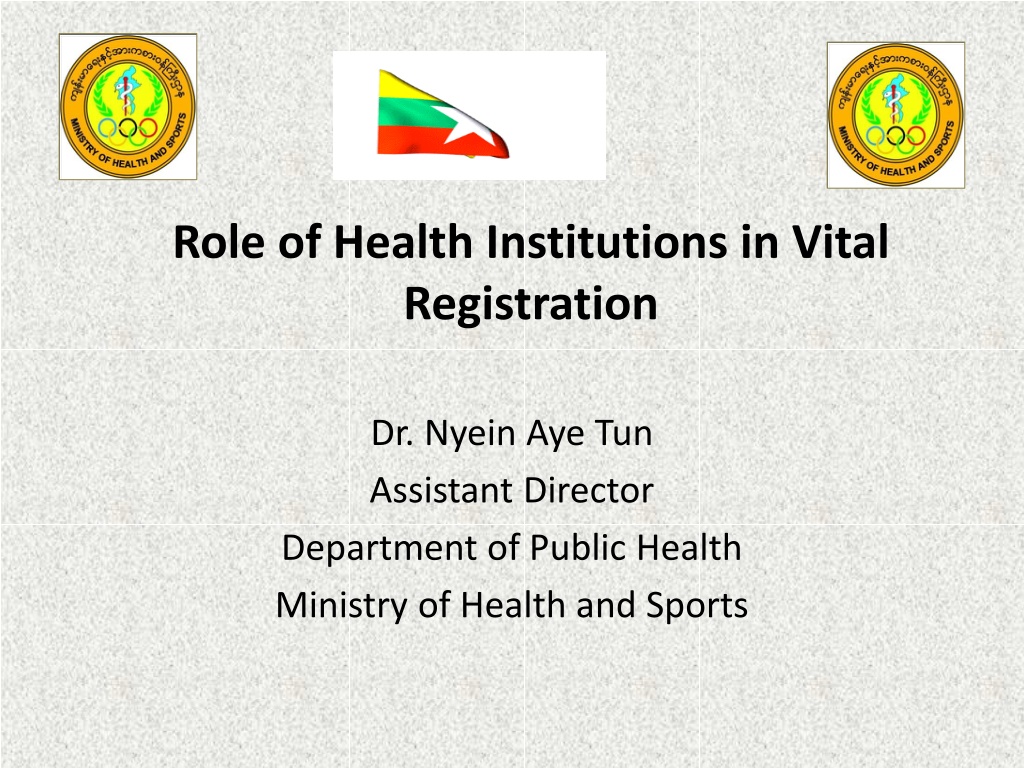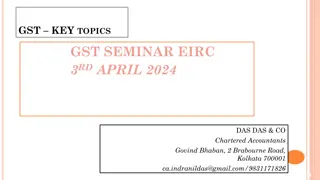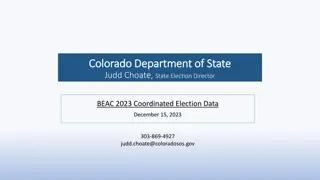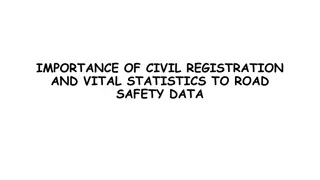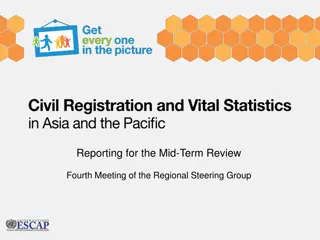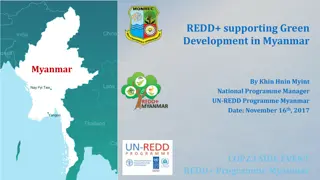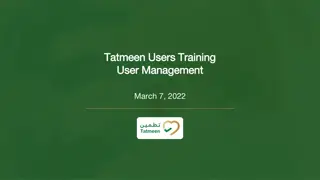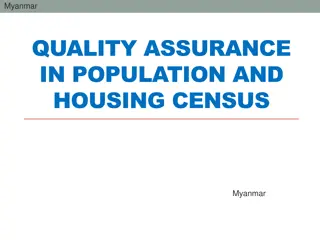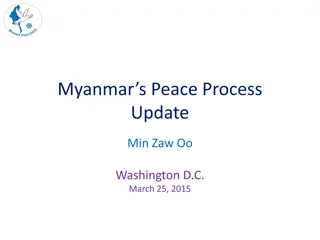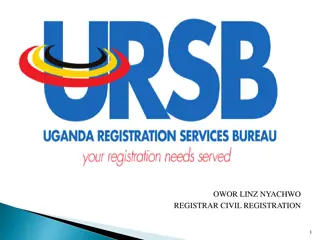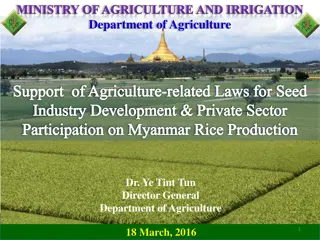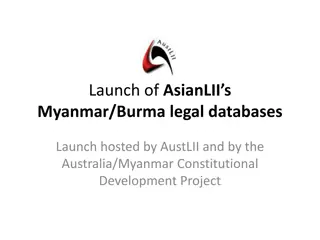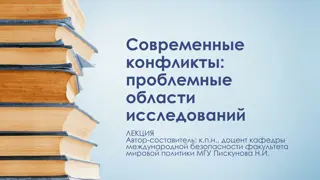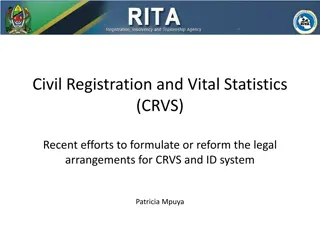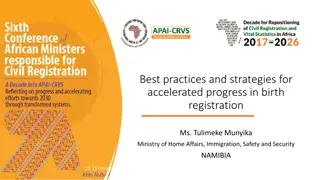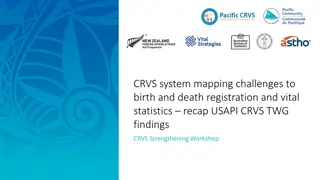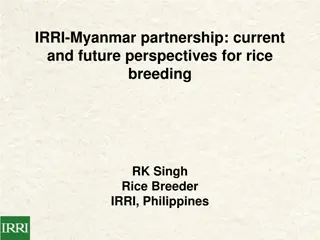Evolution of Vital Registration Systems in Myanmar
Vital registration systems in Myanmar have evolved since the early 19th century, covering about 80% of the population by 1931. In the aftermath of World War II, the system was formalized under the Ministry of Health, with registration processes streamlined over the years to include hospitals and health departments at the township level. The role of health institutions is crucial in maintaining accurate records of births and deaths, facilitating the issuance of vital certificates.
Uploaded on Sep 10, 2024 | 0 Views
Download Presentation

Please find below an Image/Link to download the presentation.
The content on the website is provided AS IS for your information and personal use only. It may not be sold, licensed, or shared on other websites without obtaining consent from the author.If you encounter any issues during the download, it is possible that the publisher has removed the file from their server.
You are allowed to download the files provided on this website for personal or commercial use, subject to the condition that they are used lawfully. All files are the property of their respective owners.
The content on the website is provided AS IS for your information and personal use only. It may not be sold, licensed, or shared on other websites without obtaining consent from the author.
E N D
Presentation Transcript
Role of Health Institutions in Vital Registration Dr. Nyein Aye Tun Assistant Director Department of Public Health Ministry of Health and Sports
Outline Background of CRVS Current Vital registration System Role of Health Institutions Other related sectors Strengths Cause of Death Ways Forward
Background of VRS in Myanmar Vital registration system started since early 19thcentury By 1931, the vital registration system covered about 80% of population in the country Disrupted during the World War II.
Background of VRS in Myanmar According to Towns Act (1907)- Deputy commissioner was empowered to all births and deaths taking place in his ward. According to villages act (1908) The village Headperson was empowered to do so.
Background of VRS in Myanmar At District level District Health Officer compiled and submitted to the Directorate of Health Services through District Commissioner. The reports from Municipal area directly sent to the Directorate of Health Services
Background of VRS in Myanmar After world war II Vital registration was firstly functioned by vital statistic section under the Directorate of Health Services, Ministry of Health
Background of VRS in Myanmar New system for VRS was started in 1962 At township and District, filling of births and deaths information forms by health staff and sent to Vital statistic section Handling of birth and death information, codifying, processing and tabulating the information done by vital section
Background of VRS in Myanmar Registration of Births and Deaths and issuing of birth and death certificates were done at Hospitals and township health departments
Background of VRS in Myanmar In 1stOctober 1964,vital section was handed over to Central Statistical and Economic Department(CSED)(now Central Statistical Organization ) (CSO) under the Ministry of Planning and Finance.
Background of VRS in Myanmar According to - Statistical Authority Act 34 of 1952, the CSO was mandated to coordinate and integrate statistics and statistical operation
Current Vital Registration System Introduced in 1962 Modified Vital Registration System in 1998 Reduce the number of forms (13 to 8) as well as size of forms ( Tri foil to A4 size) Nation wide establishment was carried out in 2001
The CRVS System in Myanmar Central Statistical Organization Medical Officers Birth certificate B & D registration Forms Death Certificate Burial Certificate Data Compile, compute and produce statistical year book B & D registration Books Until 1964 MOHS took responsible for the entire process of the CRVS system Then, MOHS and CSO take share accountabilities
The CRVS System in Myanmar Roles of MOHS Roles of CSO
Role of Health Institutions Central level Co-ordination & Cooperation with CSO Supervision , Monitoring & Feedback State / Regional Level All forms of Birth and Death received from CSO are distributed to Tsp Approval for issuing Birth certificates not registered at tsp in time
Role of Health Institutions Township Level Main Implementers Collection of Vital events Registration & issuing Certificate Reporting ( send 101 & 201 to CSO)
Community Level Basic Health Staff (Midwifes) Notification validation Registration Sent to TMO
Vital Registration System Hospital Births / Deaths (Public Hospital) Non Health facilities Births / Deaths (Urban) Hospital Births / Deaths (Private Hospital) Non Health facilities Births / Deaths (Rural) Birth / Death forms filled & MS signs and issues certificates in Hospital Birth / Death forms filled by Midwife and registered at RHC Informed to THD and Birth / Death forms filled and TMO signs and issues the certificates Filled Forms are submitted to TMO on monthly basis and TMO signs and issues the certificates Birth forms / Death forms Form101 / Form 201 (Information forms) Form 102 / Form202 (Registration Books) Form 103 / Form 203 (Certificates) Township Health Department for records Central Statistical Organization Parents / Guardians / Families Data Processing Published Statitical Yearbook
Cause of Death Improving the quality and quantity of Causes of Death information for effective health planning and policy making 2012 GBD assessment- Vital Statistic Performance Index Score is very low (0.5) due to low completeness rate, lack of reliable COD Data, quality of age & sex reporting, internal consistency Low registration coverage - Birth registration completeness (72%) is greater than death (57%)
Cause of Death Only hospital deaths (16% of total deaths) are medically certified COD by doctors Reliable COD information for community deaths (84% of total deaths) are not available Quality of COD information for hospital deaths are poor - 45% of COD information is coded to garbage codes
Cause of Death Improving the Quantity and Quality of COD information Provide the Medical Certification of COD trainings to in-service doctors Embedded the MCCOD curriculum into under and post graduate medical students courses Using the Verbal Autopsy methods to collect the community COD information through BHS Using tables to collect the VA in 48 townships across 15 states/region to obtain the representative COD data for Myanmar Add the VA curriculum into Basic Health Staff courses
Cause of Death Jointly analyze the data with CSO mainly on COD data and produce the COD distribution reports annually Maximize the usage of vital statistics and COD information in health planning and policy developing
Cause of Death General Administrative Department (MOHA) Department of Immigration and Department of Population (MOL & I)
Linkage with others CSO conduct regular meeting with all related Departments sharing the reporting status and comparing the vital data According to reporting status , DOPH gives feed back to State/Regional Health Department & Township Health Department GAD also gives feedback to tsp/wards/village tract administrators to cooperate with health staff in VRS
Strengths for VRS Formation of Coordination Committee for VRS up to the grass root level headed by Union Minister , MOHS. UNICEF ;main organization supports Birth Registration both technical and logistics. Bloomberg data for Health Initiative supports Death registration especially cause of deaths
Coordination Committee for VRS Coordination Committee for vital registration and vital statistics up to the ward/village level on 14th January ,2014 -To strengthen and upgrade the VRS in accordance with international standard - To make the vital registration system more complete and reliable for population update - To enhance the collaborative activity of involved sectors in vital statistics report
Main activities supported by UNICEF Amendment of vital registration manual for improving accessibility and availability Capacity development of Health Staff in Birth registration Birth registration campaign Roll out plan for e-platform system ( paper based to computerized system)
Main Activities supported by Bloomberg MCCOD (Medical certification of cause of death) training to Medical officers both pre service and in service. Verbal autopsy training to Basic Health Staff both pre service and in service
Ways Forward Nation wide development and implementation of electronic data based system Providing adequate training to medical doctors and coders (CSO staff)on the principles of ICD for certifying and coding causes of death Establishment of data management, feed back and regular data quality assessment mechanism
Ways Forward Conduct regular VR training for health staff Training all health workers in health facilities and communities in conducting verbal autopsy for cause of death ascertainment Improving public awareness on benefits from and responsibilities towards registration.
